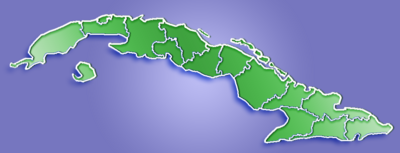Guantánamo
| Guantánamo | |
 |
|
| Coordinates: | |
| Country | |
|---|---|
| Province | Guantánamo |
| Established | 1797[1] |
| Area [2] | |
| - Total | 741 km² (286.1 sq mi) |
| Elevation | 55 m (180 ft) |
| Population (2004)[3] | |
| - Total | 244,603 |
| - Density | 330.1/km² (855/sq mi) |
| Time zone | EST (UTC-5) |
| Area code(s) | +53-21 |
Guantánamo is a municipality and city in southeast Cuba and capital of Guantánamo Province.
Guantanamo is served by the Caimanera port. Producing sugarcane and cotton wool are traditional parts of the economy.
Contents |
Geography
The municipality is mountainous in the north, where it overlays the Sierra Maestra (mountains), and borders the Windward Passage of the Caribbean Sea in the south. It is crossed by the Guantánamo, Yateras, Guaso, San Andrés and Sabanalamar rivers. The Guantánamo Bay is a natural harbour south of the city.
The municipality is divided into the barrios of Arroyo Hondo, Baitiquirí, Bano, Bayate, Caimanera, Camarones, Caridad, Corralillo, Cuatro Caminos, Filipinas, Glorieta, Gobierno, Guaso, Hospital, Indios, Isleta, Jaibo Abajo, Las Lajas, Macurijes, Mercado, Ocujal, Parroquia, Palma de San Juan, Rastro, Tiguabos and Vínculo.[1]
About 15 km away from the city lies the Guantánamo Bay, a superior natural harbour which has been controlled by the United States as the Guantanamo Bay Naval Base since 1902, following a controversial unlimited lease of the harbour to the US.
The military base contains detention centers, currently used for "unlawful combatants" captured in the War on Terrorism. The detention centers consist of the temporary Camp X-Ray, which is now closed, and the permanent Camp Delta.
Demographics
In 2004, the municipality of Guantánamo had a population of 244,603.[3] With a total area of 741 km² (286.1 sq mi),[2] it has a population density of 330.1/km² (855/sq mi).
Famous Guantanamerans
Notable natives of Guantánamo include athletes Joel Casamayor, Arnaldo Tamayo Méndez, Yumileidi Cumbá, Jaime Jefferson, Yargelis Savigne, Dayron Robles, Luis Delís, and Cuban-American gymnast Annia Hatch.
See also
- "Guantanamera" ("The girl from Guantánamo") is perhaps the best known Cuban song and that country's most noted patriotic song.
- Guantanamo Bay detention camp
References
- ↑ 1.0 1.1 Guije.com. "Guantánamo". Retrieved on 2007-10-05. (Spanish)
- ↑ 2.0 2.1 Statoids. "Municipios of Cuba". Retrieved on 2007-10-05.
- ↑ 3.0 3.1 Atenas.cu (2004). "2004 Population trends, by Province and Municipality". Retrieved on 2007-10-05. (Spanish)
External links
- Complete guide to Guantanamo City
- Detailed information about Zoologico de Piedra (Stone Zoo)
- Article about the prison history
- (Spanish) City webpage
|
|||||||||||||||||